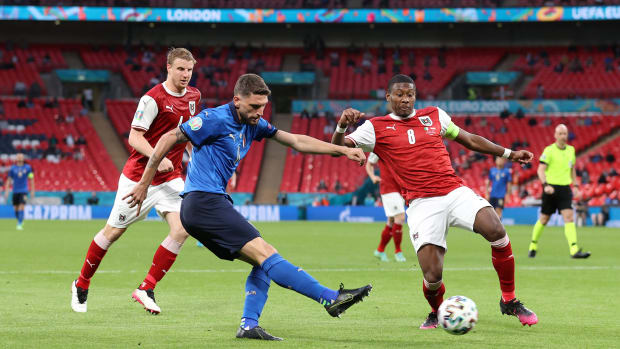The Azzurri survived an extra-time scare from Austria in the Euros' last 16, and while that may alter the perception about them, they've also met yet another challenge.
Italy's unbeaten streak goes on and Italy's quest at Euro 2020 goes on, though not by much. This was by far the hardest challenge Italy has faced, but, yet again, when it was asked a question, it found an answer. Progress through the group had been serene. Italy had played with fluency and verve. Saturday, in a 2–1, extra-time win over Austria in London's Wembley Stadium, it got through thanks to resilience, character, a stunning finish from Federico Chiesa and some late resistance.
Chiesa, whose father, Enrico, scored at Euro 1996, had only come on as an 84th-minute substitute, but, when Leonardo Spinazzola’s cross reached him at the back post five minutes into extra time, he controlled the ball on his chest, turned back inside Martin Hinteregger and slammed the ball past Daniel Bachmann. The sense of relief was almost palpable. Another Roberto Mancini substitute, Matteo Pessina, pounced 10 minutes later as Austria struggled to clear a corner to double the advantage.
Italy is now unbeaten in 31 games, breaking an 82-year-old national record. Just as significant in the context of the tournament, Saša Kalajdžić's sensational header seven minutes from the end of extra time ended Italy's run of 11-plus games without conceding (1,168 minutes, another new national record), but Austria could not find a second. The Azzurri will now face either Belgium or Portugal in a quarterfinal in Munich in their biggest test yet, but this proved to be a mighty one as well.

It quickly became apparent that Austria, playing in its first knockout game since 1954 (although it did reach the second phase of both the 1974 and 1987 World Cups), presented a far sterner challenge than anything Italy had faced so far. Franco Foda was far from universally popular in Austria at the end of qualifying, but this is the most competitive Austria has looked in almost half a century. Italy dominated possession early on, but the incursions of Konrad Laimer on the right and the passing ability of Hinteregger at least hinted at a way Austria might break through.
The better chances still went the way of Italy. Bachmann made a reflex block with his right foot to keep out a Nicolò Barella effort, and Ciro Immobile, turning smartly, sent a 25-yarded dipping against the post. Spinazzola, thrusting down the left, was a major danger—although Italy felt very lopsided, offering almost no threat on the right. This was not quite the fluent Italy of the group stage. Marco Verratti was preferred to Manuel Locatelli, which perhaps changed the dynamic slightly.
Austria seemed surprisingly unruffled before halftime by the Italian press, which perhaps wasn’t quite as intense as it had been. At the same time, it made an astonishing 18 tackles in the first half—by far the most by a side in a single half at this tournament. As the second half wore on, Italy became a little anxious, something evident in the furious reaction of its players to the awarding of a free kick on the edge of their own box. David Alaba couldn’t quite get the ball down in time, but the warning was there.
The passing was off, the verve gone. Doubts began to assault the positivity generated by the group stage. Was the 30-game unbeaten run illusory? After all, Italy in that run had played only one match against a team in the top 15 of the FIFA world ranking, a draw against Portugal back in 2018. Was there, perhaps, still a sense of insecurity following the humiliation of the failure to qualify for the 2018 World Cup? Was Italy perhaps paying for making so many changes in its final group game? It had already qualified for the knockout stage, but making wholesale changes can knock a team out of its rhythm.

Italy, suddenly, was wobbling badly. Marcel Sabitzer had a shot deflected just wide. Marko Arnautović had a header ruled out for a tight offside call (whether Arnautović should even have been available was a matter for some to debate; a one-game suspension for his verbal abuse of Ezgjan Alioski in the opening game against North Macedonia seemed oddly lenient). In the second half, Austria was by some margin the better side (an indication of how the balance shifted was that it made only eight tackles in the second half). After all the talk of a bold new Italy, this felt a lot like the nervy old Italy. But then, as Spain and England could both attest, when national sides fail, they tend to fail in stereotypical ways.
Italy had played seven previous periods of extra time at the Euros, and had failed to score in any of them (conceding only once, David Trezeguet’s golden goal winner for France in the Euro 2000 final). But this is not the Italy of old. It did not get dragged down by fear, did not settle for penalties and the option of a largely blame-free exit. Kalajdžić's late goal made the final minutes a little anxious, but Mancini had made his changes, inspired Italy to push forward and was rewarded. Any aura of invincibility that had been built over the last three games—or the last 30—may have lost some sheen, but Italy defiantly marches on.
More Euro 2020 Coverage:
No comments:
Post a Comment